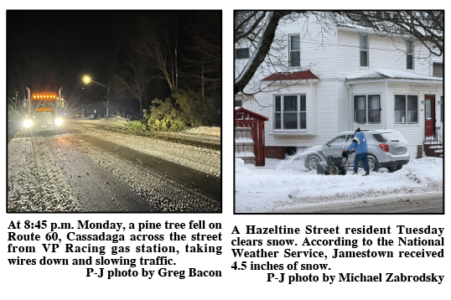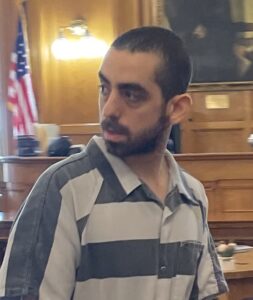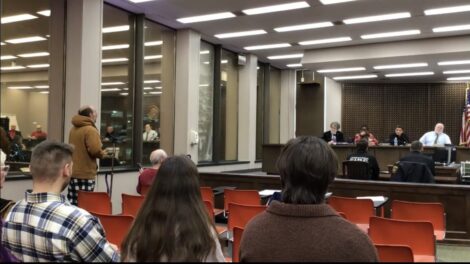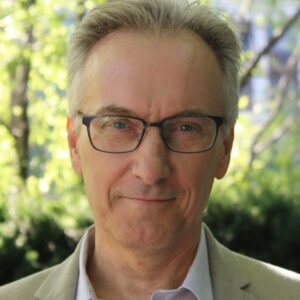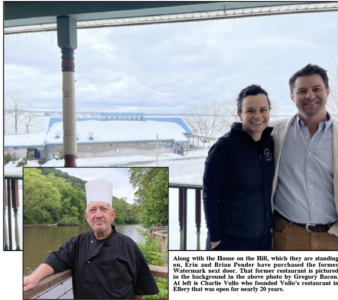Address To The World
Jackson’s Nuremberg Remarks Remembered 75 Years Later
- Saturday marks the 75th anniversary of Robert H. Jackson’s opening address before the International Military Tribunal as the United States’ chief of counsel for the Nuremberg trials. Submitted photo
- In this Sept. 30, 1946 file photo, members of the International Military Tribunal read the verdicts in the courtroom of the Palace of Justice in Nuremberg, Germany. AP photo
- In this Sept. 30 1946 file photo, defendants listen to part of the verdict in the Palace of Justice during the Nuremberg War Crimes Trial in Nuremberg, Germany. Seated in the first row in the prisoner’s dock are, from left: Hermann Goering, wearing dark glasses; Rudolf Hess; Joachim von Ribbentrop; Wilhelm Keitel; Ernest Kaltenbrunner; Alfred Rosenberg; Erich Raeder, wearing dark glasses; Wilhelm Frick; Julius Streicher;and Walter Funk. In the back row in front of the police guards are, from left: Karl Doenitz; Constantin von Neurath; Baldur von Schirach, wearing dark glasses; Fritz Sauckel; Alfred Jodl; Franz von Papen; Arthur Seyss-Inquart; and Albert Speer. Seated at the tables in front of the defendants are their council. Germany marked the 75th anniversary of the landmark Nuremberg trials of several Nazi leaders and in what is now seen as the birthplace of a new era of international law on Friday. AP photo

Saturday marks the 75th anniversary of Robert H. Jackson’s opening address before the International Military Tribunal as the United States’ chief of counsel for the Nuremberg trials. Submitted photo
Julia Craighill did not know her maternal grandfather, the late U.S. Supreme Court Justice Robert Jackson. He passed away three years before she was born.
But through her parents, she learned of the indelible mark the Spring Creek, Pa., native and Jamestown resident left on the legal community at home; but, Craighill’s family always felt that it was the mark that he left abroad, through his work as Chief of Counsel of the United States for the Nuremberg trials, that deserved more attention than it had received.
“Growing up, my parents always told me about Nuremberg and were really sort of discouraged that it was, at that time in the 1960s, ’70s, ’80s, relegated to the dustbin of history,” she said. “They felt that it really was not only an amazing achievement, but something that needed to be remembered.”
With much due credit to the center named in his honor, Jackson’s legacy in prosecuting the perpetrators of the Nazi regime has continued to be remembered within the red brick confines of its 305 E. Fourth St. home and beyond.
That is especially so today.

In this Sept. 30, 1946 file photo, members of the International Military Tribunal read the verdicts in the courtroom of the Palace of Justice in Nuremberg, Germany. AP photo
Today marks 75 years since the then-53-year-old “Mr. Justice Jackson,” on leave from the nation’s high court, delivered his opening statement before the International Military Tribunal at Nuremberg’s Palace of Justice. The address laid the foundation for the trial, in which the highest-ranking remaining officials from the Third Reich. Ten months later, 12 of the accused were sentenced to death, seven received prison sentences, ranging from 10 years to life sentence, three were acquitted and two were not charged.
“Because the Nuremberg Trials were the first time that aggressors in a large scale conflict were to be held accountable for their actions, it was important that the right precedent be set,” said Kristan McMahon, Jackson Center president, noting that Jackson had offered to resign a few different times during World War II to do some sort of war service.
“(President Franklin Delano) Roosevelt said on each of those occasions, ‘No, I need you where you are,'” McMahon noted. “But with Nuremberg, (Jackson) saw this as his opportunity for war service and to assist his country in this manner. His appointment as the chief of counsel for the United States also was an indication from the U.S. to see just how seriously they were taking these crimes. It would prompt a corresponding seriousness and elevated person representing the other countries.”
After his appointment by President Harry Truman, Jackson spent months working on the opening address. A gifted writer, he wrote much of it himself.
“His writings are powerful and personal, and they came from him, not from ghost-writing assistants,” John Q. Barrett, a professor of law at St. John’s University who serves the center as its Elizabeth S. Lenna Fellow wrote on his “Jackson List” website earlier this week, calling the opening statement one of his “finest pieces of writing.”

In this Sept. 30 1946 file photo, defendants listen to part of the verdict in the Palace of Justice during the Nuremberg War Crimes Trial in Nuremberg, Germany. Seated in the first row in the prisoner’s dock are, from left: Hermann Goering, wearing dark glasses; Rudolf Hess; Joachim von Ribbentrop; Wilhelm Keitel; Ernest Kaltenbrunner; Alfred Rosenberg; Erich Raeder, wearing dark glasses; Wilhelm Frick; Julius Streicher;and Walter Funk. In the back row in front of the police guards are, from left: Karl Doenitz; Constantin von Neurath; Baldur von Schirach, wearing dark glasses; Fritz Sauckel; Alfred Jodl; Franz von Papen; Arthur Seyss-Inquart; and Albert Speer. Seated at the tables in front of the defendants are their council. Germany marked the 75th anniversary of the landmark Nuremberg trials of several Nazi leaders and in what is now seen as the birthplace of a new era of international law on Friday. AP photo
“Justice Jackson did, however, take input on his writing,” Barrett said. “Sometimes he worked from drafts written by others. More often, Jackson wrote his own first drafts. Then he would share them with trusted colleagues to get their comments while he continued to work on the draft.”
Barrett said Jackson began to work on this particular address in early October 1945, as the indictment of the Nazi defendants were being finalized. By Nov. 15, he delivered it to colleagues from the United Kingdom to review. Both — Hartley Shawcross and David Maxwell Fyfe — were delighted with it.
“It is inexorable but temperate in its language, except where the Nazis speaking for themselves make it impossible to use the words of ordinary human beings,” Fyfe, a former U.K. Attorney General wrote.
The address, in its entirety, lasted several hours in length. In one of its most enduring passages, Jackson warns of the dangers the Nazi regime unlocked for future generations to possibly replicate.
“What makes this inquest significant is that these prisoners represent sinister influences that will lurk in the world long after their bodies have returned to dust,” he wrote. “We will show them to be living symbols of racial hatreds, of terrorism and violence, and of the arrogance and cruelty of power.”
“He called out things that I think are really a lesson for today: the threats of extremism, hatred, racism, fierce nationalism and militarism,” Craighill said in citing the line. “He was calling these things out. He knew that they were not going to be eradicated. It’s something that I think we all need to be mindful of.”
“One of his greatest strengths for me was how much he writes for the audience in a way and using language that was geared toward that audience regardless of age or backgrounds,” McMahon said.
“This was addressed to more than just the tribunal members and more than the men sitting in the prisoner’s dock, though they were important and he was absolutely speaking to them — it was to the world as well,” she added. “He needed to make sure that when the world heard this opening, why this was happening and why it could happen and it be open, transparent and believable so that whatever the outcomes could be, they could be trusted.”
To commemorate the address’ magnitude, the center will premiere an oral reading of the address featuring dozens of readers, including board members, staff members, volunteers, interns, educators and representatives from the Department of Justice and United Nations. It is set to premiere today on the center’s YouTube channel and at roberthjackson.org.
“I’m really excited by this undertaking,” McMahon said of the video project, crediting local videographer Ed Tomassini for being its “saving grace.”
It really does span a lot of different areas where Jackson has touched,” she said of the participants. “I’m thrilled with the number of people that participated and more than 100 people participated in this.”
And, despite the year’s ups-and-downs, Craighill is grateful that her grandfather’s legacy — three quarters of a century later — is being remembered.
“The celebration of the sort of magnitude that I’m observing is very heartening,” she said. “I think it’s really great that I’m seeing in the press as well as the Jackson Center celebrating it.”




